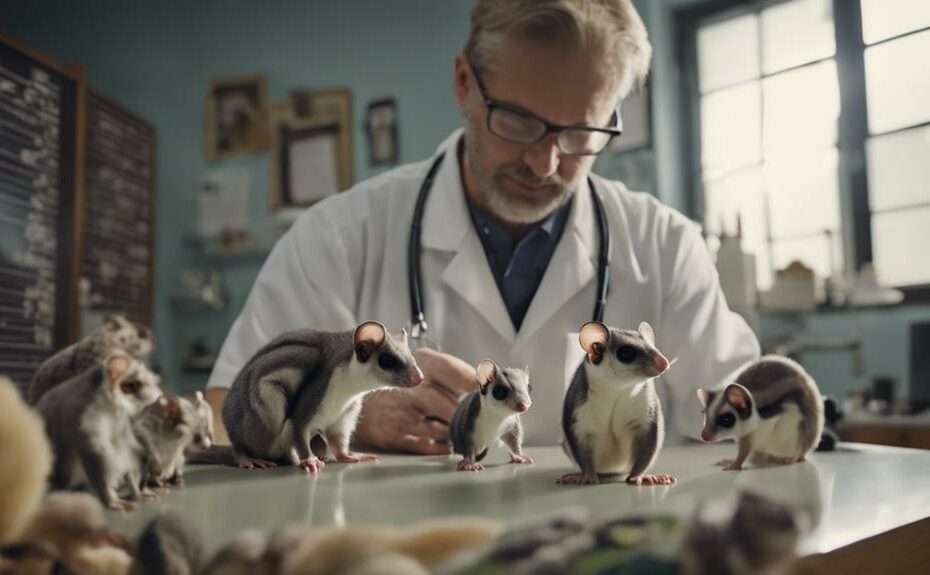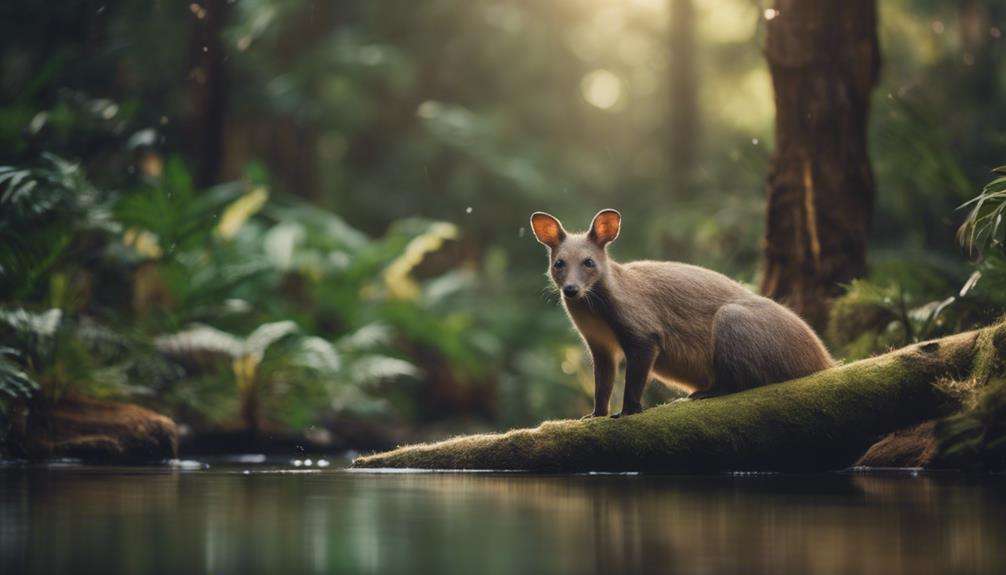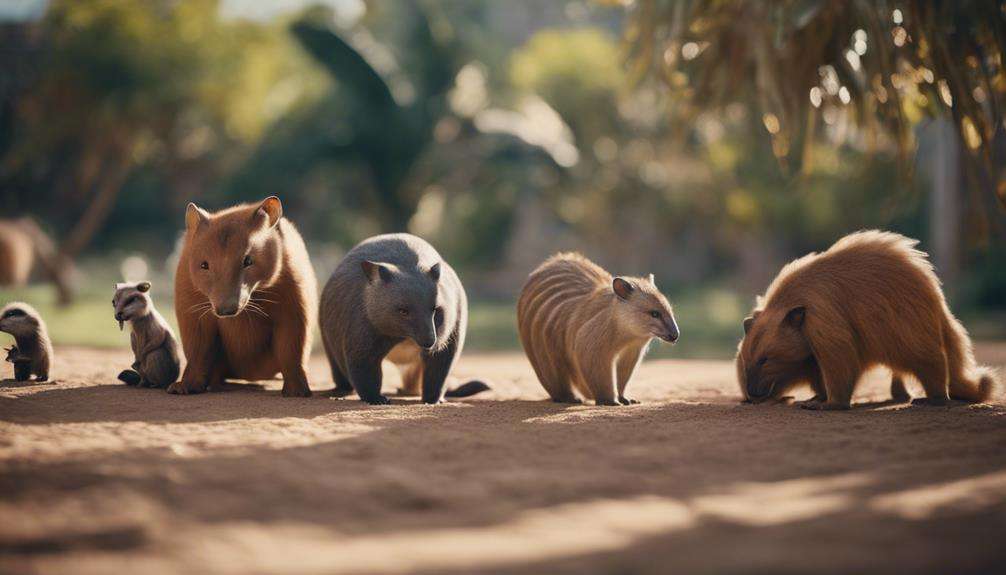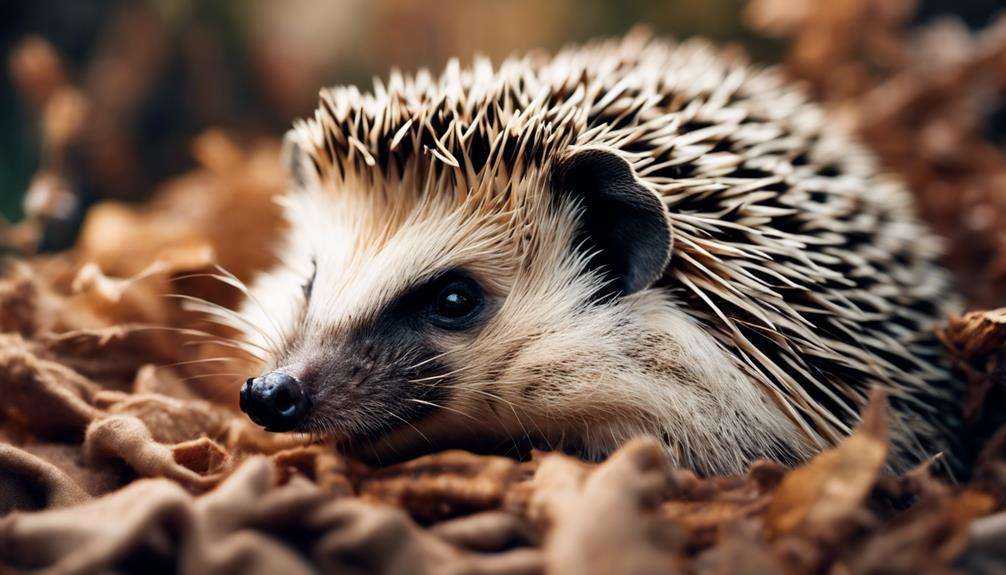As an owner of exotic mammal pets, navigating their health concerns can feel like untangling a complex web of possibilities. From zoonotic diseases lurking in the shadows to the risk of injuries from handling, the path to ensuring your exotic pets' well-being is fraught with challenges.
However, one crucial aspect often overlooked is the impact of nutritional deficiencies on these unique creatures. Let's explore why understanding their dietary needs is paramount in safeguarding their health and longevity.
Key Takeaways
- Dental health is crucial for exotic mammals like rabbits and chinchillas due to their continuously growing teeth.
- Parasitic infections, such as fleas and worms, pose significant risks to the health of exotic mammals.
- Respiratory issues, common in ferrets and guinea pigs, require swift treatment to prevent escalation.
- Skin disorders like fur loss and itchiness are prevalent in exotic mammals and need regular veterinary attention.
Nutritional Deficiencies
Nutritional deficiencies in exotic mammal pets often stem from inadequate diet compositions that lack crucial nutrients essential for their well-being. Exotic pets, such as chinchillas, are prone to calcium deficiency, which can lead to bone and dental issues. It's imperative to provide these animals with a balanced diet rich in calcium to support their skeletal health. Similarly, guinea pigs are susceptible to vitamin C deficiency, resulting in conditions like scurvy that can impact their overall health. Ensuring that guinea pigs receive sufficient vitamin C through their diet is vital for preventing such deficiencies.
Moreover, hedgehogs are at risk of obesity due to high-fat diets that may lack essential nutrients. Maintaining a well-rounded diet for hedgehogs is crucial to prevent obesity-related health issues. Additionally, exotic mammal pets like ferrets can suffer from iron deficiency anemia if their diet is lacking in iron-rich foods. Including sources of iron in their diet is essential for maintaining their overall health and vitality. Proper nutrition is key to preventing these common nutritional deficiencies in exotic mammal pets.
Dental Health Issues
Exotic mammal pets, such as rabbits and chinchillas, are prone to dental health issues that can cause pain and difficulty eating. These exotic pets have continuously growing teeth that require proper wear to prevent overgrowth, which can lead to malocclusion, trauma, or other dental problems. Veterinary Medicine emphasizes the importance of regular dental care for exotic mammals to maintain their oral health.
Proper dental care for exotic pets involves providing appropriate chew toys and a diet that promotes natural wear of their teeth. Signs of dental problems in exotic mammal pets include drooling, difficulty chewing, weight loss, and decreased appetite. If left untreated, dental issues can progress to infections and abscesses, causing significant discomfort for the animals.
To prevent these problems, exotic mammal owners should schedule routine check-ups with a veterinarian experienced in exotic pet care. Veterinary professionals can assess the dental health of these animals and provide guidance on proper dental care practices to ensure a healthy and pain-free mouth for exotic pets.
Parasitic Infections
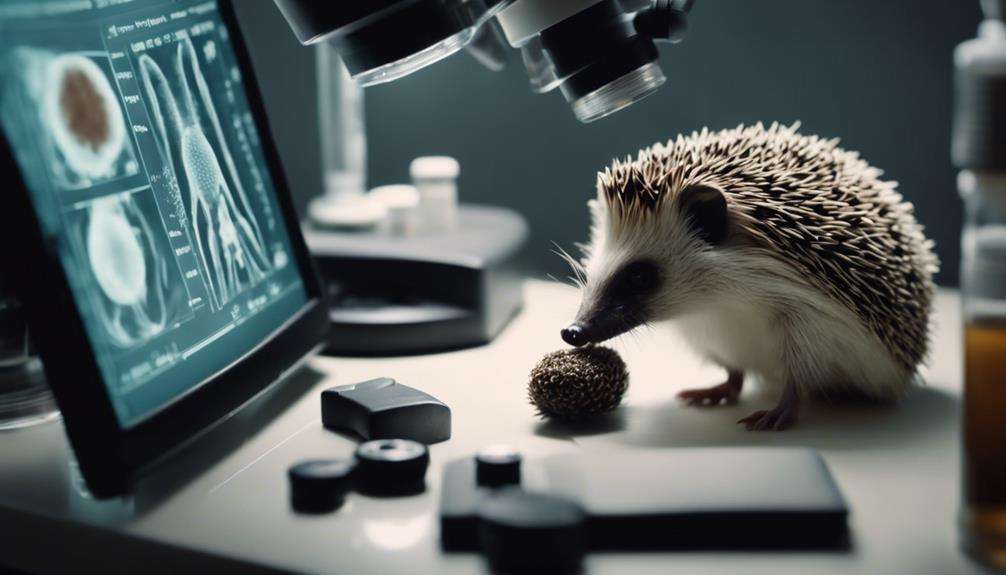
Parasitic infections in exotic mammal pets pose significant health risks and require prompt identification and treatment to ensure the well-being of these unique animals. These infections can be caused by various parasites such as fleas, ticks, mites, and intestinal worms. Common symptoms of parasitic infections in exotic mammals include skin irritation, hair loss, digestive issues, and lethargy. To prevent such infections, it's crucial to schedule regular veterinary check-ups, administer parasite control medications as prescribed, and maintain a clean living environment for your exotic pet.
Diagnosis of parasitic infections in exotic mammals involves thorough fecal examinations, skin scrapings, blood tests, and physical examinations conducted by a knowledgeable veterinarian. Treatment for parasitic infections may include deworming medications, topical treatments for external parasites, and environmental decontamination to eliminate any lingering parasites. By taking these preventive measures and promptly addressing any signs of parasitic infections, you can help ensure the continued health and well-being of your exotic mammal pet.
Respiratory Problems
When addressing respiratory problems in exotic mammal pets, vigilance in recognizing early symptoms and seeking prompt veterinary care is crucial to ensuring their health and well-being. Exotic mammals like ferrets, rabbits, and guinea pigs are particularly susceptible to respiratory infections due to their small airways and sensitive respiratory systems. Common causes of respiratory issues in these animals include viral and bacterial infections, allergies, and exposure to environmental irritants.
Key Points:
- Symptoms: Watch out for signs such as coughing, sneezing, nasal discharge, wheezing, labored breathing, and decreased activity levels in your exotic mammal pet.
- Rapid Progression: Respiratory infections in exotic mammals can escalate swiftly, leading to severe complications if not promptly diagnosed and treated by a veterinarian.
- Preventive Measures: Ensure proper environmental hygiene, schedule regular veterinary check-ups, and avoid exposing your exotic pet to tobacco smoke or strong fumes to help prevent respiratory issues.
Being proactive and attentive to your exotic mammal's respiratory health can make a significant difference in their overall well-being.
Skin Disorders
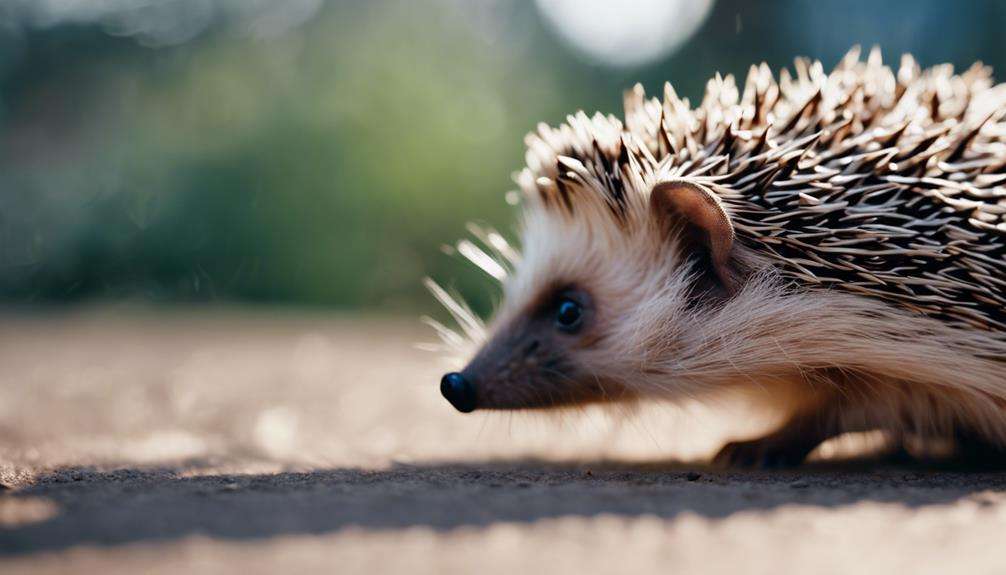
To ensure the optimal health and well-being of your exotic mammal pet, understanding and addressing skin disorders is essential as they're prone to various issues affecting their fur and skin. Exotic mammals such as ferrets, rabbits, and guinea pigs are susceptible to skin disorders like fur loss, itchiness, redness, and flaky skin. These problems can stem from factors such as parasites, allergies, poor nutrition, or environmental conditions. Dermatitis, mites, fungal infections, and hormonal imbalances are common culprits behind skin issues in exotic mammals.
Regular veterinary check-ups are crucial in preventing and managing skin disorders in exotic mammal pets. Your veterinarian can provide guidance on proper hygiene practices and recommend a balanced diet to support your pet's skin health. Additionally, prompt veterinary care can help diagnose and treat any skin conditions early on, preventing them from escalating into more severe issues. By being proactive and attentive to your exotic mammal's skin health, you can ensure they lead a comfortable and happy life.
Frequently Asked Questions
What Are the Health Risks of Owning Exotic Pets?
When owning exotic pets, you face health risks like zoonotic infections, parasitic infestations, and nutritional deficiencies. Stay informed about these dangers, implement preventive measures, and prioritize hygiene to safeguard your well-being and that of your unusual companions.
What Diseases Do Exotic Animals Carry?
Exotic animals carry zoonotic diseases that can transmit to humans. Prevent parasitic infections through hygiene and vet care. Contain viral outbreaks with proper measures. Stay vigilant to protect both your health and your exotic pet's well-being.
What Problems Might Someone With an Exotic Pet Run Into?
You might encounter nutritional deficiencies, environmental stress, and behavioral issues when owning an exotic pet. These challenges require specialized care, accurate information on diet, habitat, and enrichment activities tailored to your pet's species for optimal health and well-being.
What Is the Safest Exotic Animal to Own?
For the safest exotic animal to own, consider your lifestyle and space. Sugar gliders, hedgehogs, chinchillas, pygmy goats, and skunks, when properly cared for, can make great companions. Ensure exotic pet suitability, care, and behavior align with your capabilities.
Conclusion
As you navigate the intricate world of exotic mammal pet care, remember to tread carefully like a skilled tightrope walker.
Just as they balance on a thin line, you must balance the health concerns of your unique companions.
By staying attuned to their nutritional needs, dental health, parasite risks, respiratory issues, and skin conditions, you can ensure a harmonious bond with your exotic pets.
Keep this delicate dance in mind as you provide the specialized care they deserve.
